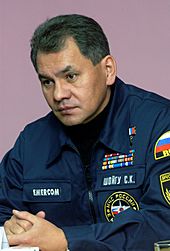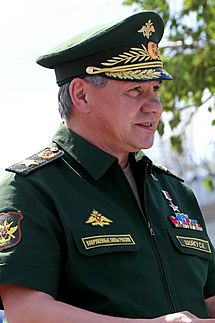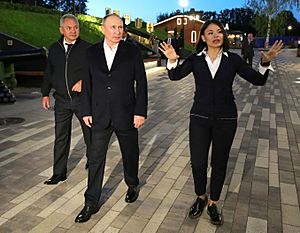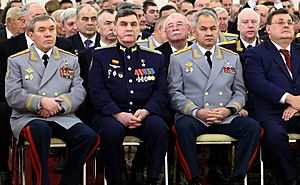Sergei Shoigu facts for kids
Quick facts for kids
Sergei Shoigu
|
|
|---|---|
| Сергей Шойгу | |
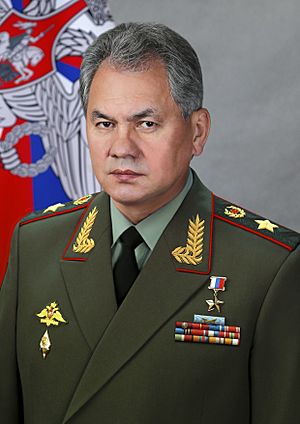
Official portrait, 2014
|
|
| Minister of Defence | |
| In office 6 November 2012 – 12 May 2024 |
|
| President | Vladimir Putin |
| Prime Minister | |
| Preceded by | Anatoly Serdyukov |
| Succeeded by | Andrey Belousov |
| Chairman of the Council of Ministers of Defense of the CIS | |
| Assumed office 11 December 2012 |
|
| Preceded by | Anatoly Serdyukov |
| Governor of Moscow Oblast | |
| In office 11 May 2012 – 6 November 2012 |
|
| Deputy | Ruslan Tsalikov |
| Preceded by | Boris Gromov |
| Succeeded by | Ruslan Tsalikov (acting) |
| Leader of United Russia | |
| In office 1 December 2001 – 27 November 2004 Serving with Yury Luzhkov and Mintimer Shaimiev
|
|
| Preceded by | Party established |
| Succeeded by | Boris Gryzlov |
| Deputy Prime Minister of Russia | |
| In office 10 January 2000 – 18 May 2000 |
|
| Prime Minister |
|
| Leader of Unity | |
| In office 15 October 1999 – 1 December 2001 |
|
| Minister of Emergency Situations | |
| In office 17 April 1991 – 11 May 2012 |
|
| President | |
| Prime Minister |
List
Ivan Silayev
Oleg Lobov (acting) Boris Yeltsin (as President) Yegor Gaidar (acting) Viktor Chernomyrdin Sergey Kiriyenko Viktor Chernomyrdin (acting) Yevgeny Primakov Sergei Stepashin Vladimir Putin Mikhail Kasyanov Viktor Khristenko (acting) Mikhail Fradkov Viktor Zubkov Vladimir Putin Viktor Zubkov (acting) Dmitry Medvedev |
| Preceded by | Office established |
| Succeeded by | Vladimir Puchkov |
| Member of the Security Council of Russia | |
| Assumed office November 2012 |
|
| Personal details | |
| Born |
Sergei Kuzhugetovich Shoigu
21 May 1955 Chadan, Tuvan Autonomous Oblast, Russian SFSR, Soviet Union |
| Political party |
|
| Spouse | Irina Shoigu |
| Children |
|
| Parent |
|
| Relatives | Larisa Shoigu (sister) |
| Alma mater | Krasnoyarsk Polytechnical Institute |
| Awards |
|
| Signature |  |
| Military service | |
| Allegiance | Russia |
| Branch/service | Military Council of the Civil Defence Troops |
| Years of service | 1991–present |
| Rank | General of the Army |
Sergei Kuzhugetovich Shoigu (born 21 May 1955) is a Russian politician and military officer who served as Minister of Defence of Russia from 2012 to 2024. Shoigu has served as the chairman of the Council of Ministers of Defense of the Commonwealth of Independent States since 2012.
Shoigu was the Minister of Emergency Situations from 1991 to 2012. He briefly served as the governor of Moscow Oblast in 2012.
Contents
Early life and education
Shoigu was born on 21 May 1955 in Chadan, Tuvan Autonomous Oblast, to an ethnic Tuvan father, newspaper editor Kuzhuget Shoigu (1921–2010) and a Ukrainian-born Russian mother, Alexandra Yakovlevna Shoigu (1924–2011). Alexandra Shoigu grew up in the Donbas town of Kadiivka and had traumatizing experiences while under detention of the German occupation forces during World War II. Later in her career she became member of the Tuva Regional Council of People's Deputies. Kuzhuget Shoigu rose to secretary of the Tuvan Regional Committee of the Communist Party, becoming a major figure in the Communist power structure of the republic.
After graduating from Kyzyl Number 1 School in the Tuvan ASSR, Shoigu studied at the Krasnoyarsk Polytechnic Institute. Shoigu graduated in 1977 with a degree in civil engineering.
Early career
Shoigu worked in construction projects nationwide for the next decade, advancing from low levels to become an executive. In 1990, Shoigu moved to Moscow from Siberia, and was appointed deputy chairman of the State Architecture and Construction Committee of the Russian Federation.
Minister of Emergency Situations (1991–2012)
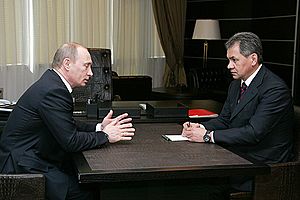
In 1991, Yeltsin appointed him head of the newly established Russian Rescue Corps, responsible for the rescue and disaster response system. The Rescue Corps replaced the previous Soviet civil defense system and soon absorbed the 20,000-strong militarized Civil Defense Troops of the Ministry of Defense, with Shoigu being appointed chairman of the State Committee of the Russian Federation for Civil Defense, Emergency Situations, and Disaster Response. Civil Defense remained a quasi-military organization in continuation of Soviet practice and Shoigu was politically involved, such as an unsuccessful attempt to evacuate Russian-backed Afghan President Mohammad Najibullah in 1992 and the intended distribution of weapons from the Civil Defense stocks to Yeltsin supporters during the October 1993 coup. In keeping with the militarized nature of Russian civil defense, Shoigu received the rank of major general in 1993, and was promoted swiftly to lieutenant general in 1995, colonel general in 1998, and to army general, in practice the highest Russian military rank, in 2003. The committee was renamed the Ministry of Emergency Situations (MChS) in 1994, making Shoigu a government minister. He became popular because of his hands-on management style and high visibility during emergency situations, such as floods, earthquakes and acts of terrorism. Under Shoigu, the responsibilities of the ministry were expanded to take over the Russian State Fire Service in 2002, making the MChS Russia's third-largest force structure.
Minister of Defence (2012–2024)
On 6 November 2012, Shoigu was appointed Minister of Defence by Putin, succeeding Anatoly Serdyukov, who had implemented sweeping reforms of the Russian Armed Forces in response to performance in the Russo-Georgian War. According to expert Sergey Smirnov, the so called "Petersburg group" of siloviki (Sergei Ivanov, Sergey Chemezov and Viktor Ivanov) had wanted one of its associates to succeed Serdyukov, but Putin was reluctant to strengthen the clan and opted for the neutral Shoigu. As defence minister, Shoigu on multiple occasions has accompanied Putin during weekend breaks that the pair would spend at undisclosed locations in the Siberian countryside.
Serdyukov was unpopular with senior military leaders and seen by them as a civilian with no military background, something that Shoigu attempted to address by symbolically tying himself to the military through wearing an army general's uniform, reviving historical units dissolved under the reforms, and reinstating officials dismissed by Serdyukov. Furthermore, Shoigu appealed for support for reform within the army rather than taking a confrontational stance, appointed deputy ministers of defense from the military, and removed Serdyukov-appointed civilian tax service officials from the top echelons of the Ministry of Defense.
As defence minister, Shoigu continued aspects of Serdyukov's attempts at modernizing the Russian Armed Forces through reform. This included the creation of the Special Operations Forces Command to facilitate rapid intervention in conflicts within the perceived Russian sphere of influence and counterterrorism efforts. Serdyukov's goals of increasing the share of the Russian Armed Forces made up of professional contract servicemen rather than conscripts continued under Shoigu. However, the demographic challenge of a decreasing pool of military-aged and -eligible males forced him to increase national conscription quotas in early 2013, including even North Caucasians perceived as a security risk by authorities such as Chechens. This followed on from Serdyukov's initiatives of reducing available draft exemptions.
In November 2012, Shoigu decided to resurrect the tradition of Suvorov and Nakhimov cadets participating in the 9 May parade.
In July 2013 Shoigu ordered commanders to begin every morning in the barracks with a rendition of the Russian anthem, to compile an obligatory military-patriotic book reading list and to take responsibility for the preparation of demobilization albums (a type of memento scrapbook, which in Russian military tradition is given to conscripts upon completion of their service). In August 2013 he ordered all Defense Ministry civilian workers, other staff and management employees to wear uniforms.
Personal life
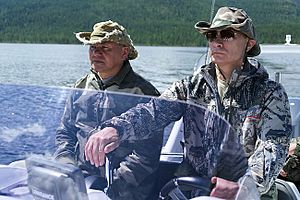
According to The Siberian Times, Shoigu is a polyglot who is known to speak eight languages other than Russian fluently, including English, Japanese, Chinese, Tuvan, and Turkish.
Family
Sergei Shoigu was born to Kuzhuget Sereevich Shoigu (1921–2010) and Alexandra Yakovlevna Shoigu (née Kudryavtseva, 1924–2011). His father was born Shoigu Seree oglu Kuzhuget. His name order was changed because of a passport error, according to the Tuva official line. More likely, he Russified the name from Turkic oglu 'son of...'. Kuzhuget was an editor of a regional newspaper. He later worked in the Communist Party and for the Soviet authorities. He was the secretary of the Tuva Party Committee. He retired with the rank of first deputy chairman of the Council of Ministers of the Tuva ASSR.
Shoigu's father led the Tuvan State Archives. He spent six years as the editor of the newspaper Pravda. He wrote the novels Time and People, Feather of the Black Vulture (2001), Tannu Tuva: the Country of Lakes and Blue Rivers (2004).
Shoigu's mother Alexandra was born in the village of Yakovlev in the Oryol Oblast. From there, shortly before the Great Patriotic War, her family moved to Kadiivka in the Luhansk Oblast, Ukraine. A zootechnician, Alexandra was an Honored Worker of Agriculture of the Republic of Tuva. From 1979 she was the head of the Planning Department of the Ministry of Agriculture of the Republic. She was repeatedly elected deputy of the Supreme Soviet (parliament) of the Tuva ASSR. Sergei's great uncle, Seren Kuzhuget, was the commander of the Tuvan People's Revolutionary Army from 1929 to 1938.
Sergei has two sisters: Larisa Kuzhugetovna Shoigu (1953–2021), who was a deputy of the State Duma; and Irina Zakharova (born 1960), a psychiatrist.
Shoigu married Irina Alexandrovna Shoigu (née Antipina). She is president of the business tourism company Expo-EM. They have two daughters, Yulia (1977) and Kseniya (1991).
Hobbies
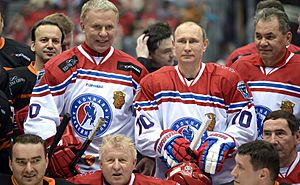
Shoigu enjoys studying the history of Russia, especially Peter the Great's time and the era between 1812 and 1825 (which includes the French invasion of Russia and the Decembrist revolt).
Shoigu collects Indian, Chinese, and Japanese swords and daggers. He enjoys bard songs and plays the guitar. He does water color paintings and graphics. He enjoys carpentry, and has shown some of his work to Putin.
Honours
Russian
- Hero of the Russian Federation
- Order of St Andrew with swords
- Order of Merit for the Fatherland 1st class
- Order of Merit for the Fatherland 2nd class
- Order of Merit for the Fatherland 3rd class
- Order of Alexander Nevsky
- Order of Honour
- Order for Personal Courage (USSR)
- Medal "For the Return of Crimea"
- Medal Defender of a Free Russia
- Medal "In Commemoration of the 850th Anniversary of Moscow"
- Medal "In Commemoration of the 300th Anniversary of Saint Petersburg"
- Medal "In Commemoration of the 1000th Anniversary of Kazan"
- Three Medals "For Strengthening Military Cooperation" (Ministry of Defence)
- Medal "For Diligence in Engineering Tasks" (Ministry of Defence)
- Medal "200 Years of the Ministry of Defence" (Ministry of Defence)
- Medal of Great Awareness in Geo-political Affairs (Foreign Ministry)
- Medal "200 Years of the Ministry of Internal Affairs" (MVD)
- Medal "For Merit of the Stavropol Territory"
- Honoured Rescue Worker of the Russian Federation
- Order of Rightitude (Ministry of Internal Affairs – for services to being correct on the territory of the Russian Federation)
- Order of "Merit of the Altai Territory"
- Honorary Citizen of Kemerovo Oblast
- Honorary Citizen of Tula Oblast
Foreign
- Medal of the Order of Courage (Abkhazia)
- First Class of the Order of Friendship (Kazakhstan)
- Medal of the Order "Danaker" (Kyrgyzstan)
- Military Class of the Order pro Merito Melitensi
- Medal of the Order of the Red Banner (Mongolia)
- Grand Commander of the Order of the Union of Burma (Myanmar) Sithu class
- Grand Cross with silver star of the Order of Ruben Dario (Nicaragua)
- First Class of the Order of the Serbian Flag (Serbia)
- Medal of the Uatsamonga Order (South Ossetia)
- Military Commonwealth Medal (Syria)
- Medal of the Friendship Order (Vietnam)
Images for kids
-
Shoigu, Vladimir Putin and Dmitry Medvedev at the Moscow Victory Day Parade, May 2014
-
Shoigu, Putin, Nikolai Patrushev and Dmitry Rogozin at a meeting of the Military-Industrial Commission of Russia on 19 September 2015
-
Shoigu meets U.S. National Security Advisor John R. Bolton in Moscow in October 2018.
-
Shoigu at the SCO defence ministers' meeting in New Delhi, India, 28 April 2023
-
Shoigu with North Korean leader Kim Jong Un in Pyongyang, North Korea, 27 July 2023
-
Sergei Shoigu, President of Russia Vladimir Putin and Chief of the General Staff Valery Gerasimov at the Center-2019 military exercises. Orenburg Oblast, 2019.
See also
 In Spanish: Serguéi Shoigú para niños
In Spanish: Serguéi Shoigú para niños
- List of Heroes of the Russian Federation


